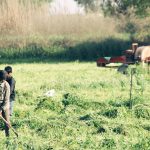You don’t have to operate a fish farm or directly sell fish to earn income. There are alternative income-generating opportunities within the value chain that can provide financial returns.
In Uteh fish community, located in Ikpoba-Ukha LGA in Edo State, a group of women has found a way to make money simply by smoking or drying fish for larger marketers and sellers, charging a fee for their services.
These women smoke a kilogram of fish for N350, and collectively process up to 150 kg within three days. This results in an average daily income of N17,000.
A dry fish marketer visits the community to purchase fresh fish directly from the farmers at the farm gate. Subsequently, they negotiate with women who will undertake the smoking process on behalf of the buyer.
Depending on the preferences of the marketer, the fish can be smoked using either a modern gas-powered smoking kiln or a traditional wood-fired method. The choice of method also impacts the price negotiated.
Marketers catering to high-end clientele often opt for dry fish as it enables them to reach consumers beyond the state borders, such as in Lagos and Abuja.
These women are not only contracted by marketers but also sought after by farmers who wish to process their fish before selling it.
This venture is a thriving business for the women, who establish their facilities alongside those provided at Sonny Fish for All Konsult. This establishment also functions as an Incubation Centre for Livelihood Improvement Family Enterprises Project for the Niger Delta—a federal government initiative aimed at fostering community-based on-farm and off-farm business activities along key agricultural value chains to stimulate job creation and wealth generation.
Mrs. Evelyn Ese has been involved in the processing business for approximately five years within the community. Despite not owning a fish pond or engaging in fish sales directly, her role revolves around processing for either farmers or marketers, for which she receives payment.
“I process between 100kg and 300kg, depending on the sizes of the fishes, and earn between N15,000 and N17,000,” she stated. “The fish undergoes proper drying over a period of about two to three days.”
“This business helps me contribute significantly to my family’s welfare,” Evelyn explained. “Through it, I can support my children and husband in meeting basic family needs.”
Ufoma Esen, another young woman in the community, has also found a means of income generation through fish processing, despite her relatively shorter stint of less than three years. She sustains herself by processing fish for both marketers and farmers.
“This business is invaluable to me as I can financially assist my parents,” she remarked. “I am no longer idle, as I engage in fish processing daily. Depending on the workload, I handle around 100kg to 80kg or more.”
Ufoma highlighted the symbiotic relationship between the fish farming business’s expansion and their processing activities. “Our business growth aligns with the expansion of fish farms,” she noted optimistically. “As the farming sector expands, so does our capacity to process more fish.”
Idemudia Ese also emphasized the financial viability of the venture for diligent women. “We receive fish from various fish farm clusters for processing. With hard work, one can earn enough to support their family,” she affirmed.
Young boys are also involved in the processing operation, assisting the women in preparing the fish for smoking. Their tasks typically involve folding the fish into round shapes for the drying process. These boys are compensated by the women who are contracted by marketers or farmers for fish processing.
Experts emphasize the importance of developing value chain activities, noting the significant employment opportunities within this sector. As fish farms expand, ancillary activities like feed sales and transportation are expected to evolve further.





